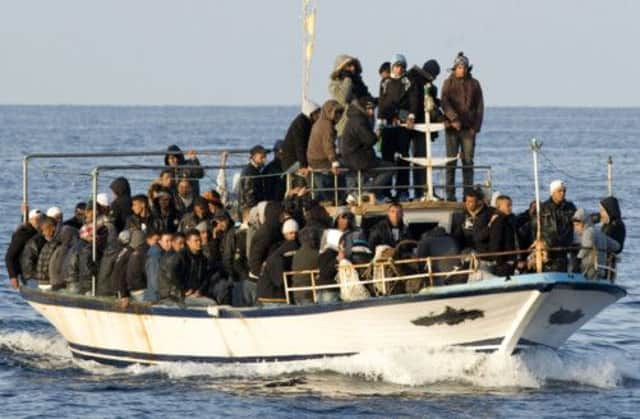Arab Spring chaos prompts surge in smuggling


Last month, European leaders in Brussels turned down calls from southern European states already hard hit by the euro-zone crisis for additional support to tackle record numbers of migrants attempting to cross to the continent in frequently perilous journeys arranged by people smugglers.
More than 32,000 migrants from Africa and the Middle East have arrived in Italy and Malta this year, said the United Nations. More than 550 died in October alone, as autumn storms made a difficult crossing in small, poorly-maintained boats even more dangerous.
Advertisement
Hide AdAdvertisement
Hide AdSyria’s civil war and chaos in Libya have sparked a surge in arms smuggling, while drug runners use similar routes to ship North African hashish and Latin American cocaine.
“You have a perfect storm of money, conflict, instability and illicit supply and demand,” said Masood Karimipour, United Nations Office for Drugs and Crime representative for North Africa and the Middle East.
“The migrant issue is the one that is grabbing the headlines, but it’s only a symptom of a much wider regional problem.”
Foreign powers are facing increasing calls to step in, just as the international community was forced to send warships to the Indian Ocean for counter- piracy patrols. Italy and Malta, the two European countries closest to Libya, have borne the brunt of the migrant crisis and said other European countries should provide more assistance, perhaps through the European border agency Frontex.
“In theory, everyone is in favour of information sharing, but in reality, it is not always that easy,” said one Western official on condition of anonymity, contrasting it with the more tightly co-ordinated US-led efforts to stem smuggling in the Caribbean. “The Mediterranean is a lot more complicated.”
While the migrant crisis is relatively well documented, reliable data on other smuggling and crime is patchy.
Those who watch the Syrian conflict closely, however – including the growing number of online videos showing weaponry – said smuggling from Libya to Syria has become perhaps the most significant source of rebel arms in the last year. While the Syrian coast remains largely in government hands, weaponry is believed to be slipping in through Lebanon and Turkey.
“Libya is a largely open market – no arms export licensing, no real customs, coastline effectively out of what passes for government control,” said Hugh Griffiths, illicit trafficking researcher at the Stockholm International Peace Research Institute. “There are plenty of places along the coastline between Turkey and Lebanon where ships can be unloaded.”
Advertisement
Hide AdAdvertisement
Hide AdWith Syrian president Bashar al-Assad’s government preoccupied with its battle for survival, Mr Karimipour said: “There has been a complete collapse of the security sector in Libya and Syria, and we are seeing both emerging as a major supply routes for drugs and arms to the rest of the Middle East.”